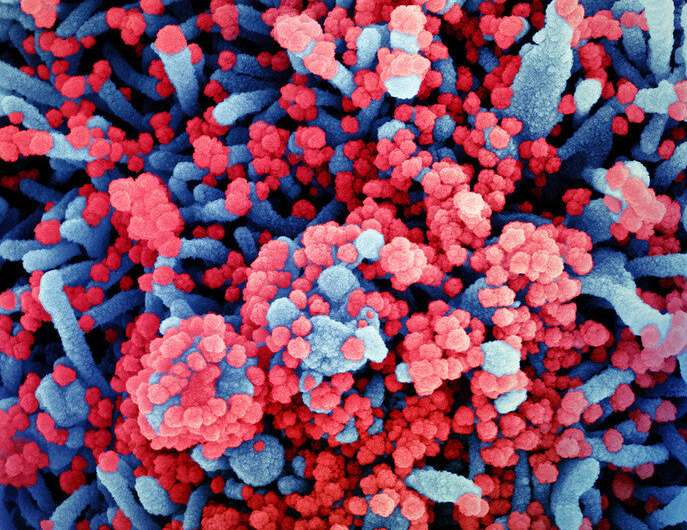Medicine for multiple sclerosis patients inhibits coronavirus—at least in a test tube

An antiviral medication which effectively inhibits replication of the coronavirus causing the COVID-19 and, at the same time, fights the immune reaction that is killing COVID-19 patients around the world.
This is the hope of a group of researchers headed by Christian Kanstrup Holm and David Olagnier who are behind a newly-published new study in the journal Nature Communications. The study shows that a drug called dimethyl fumarate (DMF), which is approved for the treatment of multiple sclerosis patients, inhibits the growth of a range of viruses in the body's cells and that this includes the coronavirus (SARS-CoV2) - at least when the researchers test it in a test tube.
"As we're doing basic research, we obviously don't know whether the drug works on infections in humans, and it's up to the infectious disease experts to test for this. However, I have to say that I'm very optimistic," says Christian Kanstrup Holm, who, like his colleague David Olagnier, is associate professor at the Department of Biomedicine at Aarhus University, Denmark.
The current research results have been underway for a while now. When the pandemic struck, Christian Kanstrup Holm and his colleagues were in the process of testing the effects of a drug which was virtually identical with a particular sclerosis medicine, namely a substance called 4-octyl-itaconate, which is used on e.g. the herpes virus, smallpox virus (vaccinia virus) and zika virus, and which is also known to lead to fetal defects—all as part of the hunt for a broad spectrum antiviral medication. And their testing succeeded beyond expectations.
"Then the coronavirus suddenly appeared, which we therefore also tested, and saw an enormous effect. The number of duplications that the coronavirus makes of itself in the body's cells were simply drastically reduced," explains Christian Kanstrup Holm.
"At the same time, the drug inhibited the immune reaction or inflammatory condition that constitutes a large portion of the actual threat for coronavirus patients. People don't just die of the virus in itself, but also of the inflammation that occurs in the lungs," he says.
When the research group saw the encouraging results with 4-octyl-itaconate, they repeated the tests with a corresponding approved product, dimethyl fumarate (DMF), which showed virtually the same inhibitory effect.
This means that the effect of dimethyl fumarate (DMF) can be tested on corona patients 'here and now', if clinicians in Denmark or abroad—and the company that holds the patent—are prepared to test it in human trials.
"You can really save a lot of time when you're testing a medication that has already been approved and tested in another context," says Christian Kanstrup Holm with reference to the statutory phases involved in getting a medication approved from scratch.
"I'd really likely to be attached to this type of clinical trial if there are infectious disease researchers who assess that the result is worth proceeding with. As a basic researcher, I have neither access to patients, nor am I qualified to conduct clinical testing," he adds.
More information: David Olagnier et al, SARS-CoV2-mediated suppression of NRF2-signaling reveals potent antiviral and anti-inflammatory activity of 4-octyl-itaconate and dimethyl fumarate, Nature Communications (2020). DOI: 10.1038/s41467-020-18764-3


















